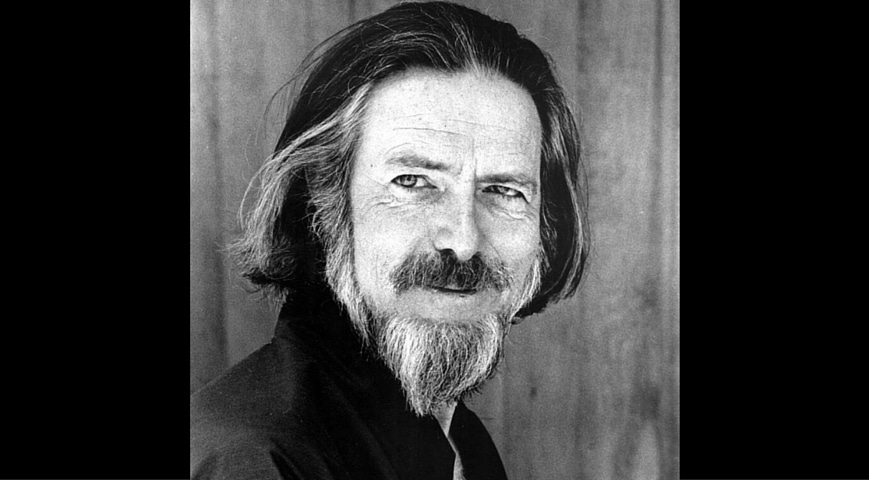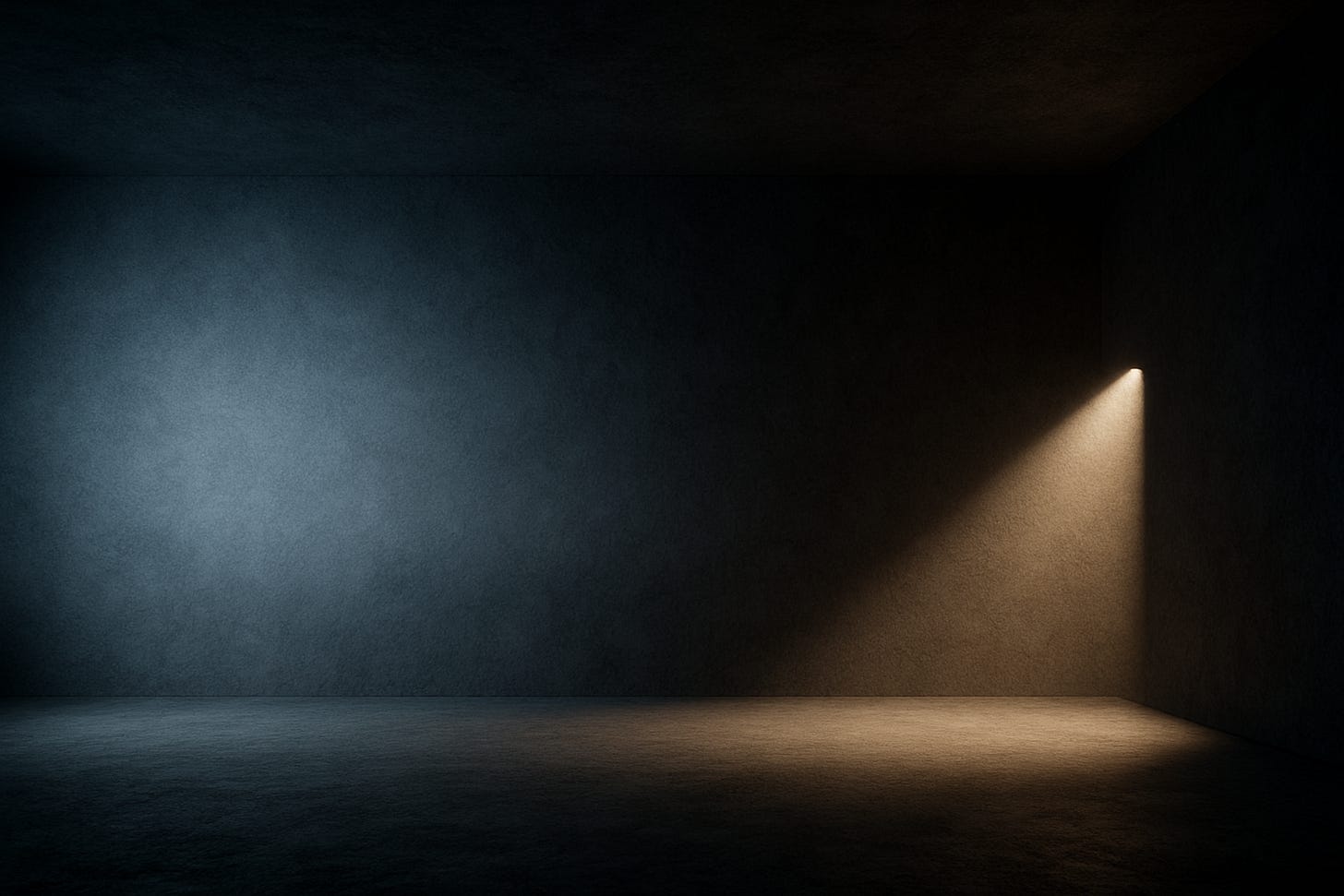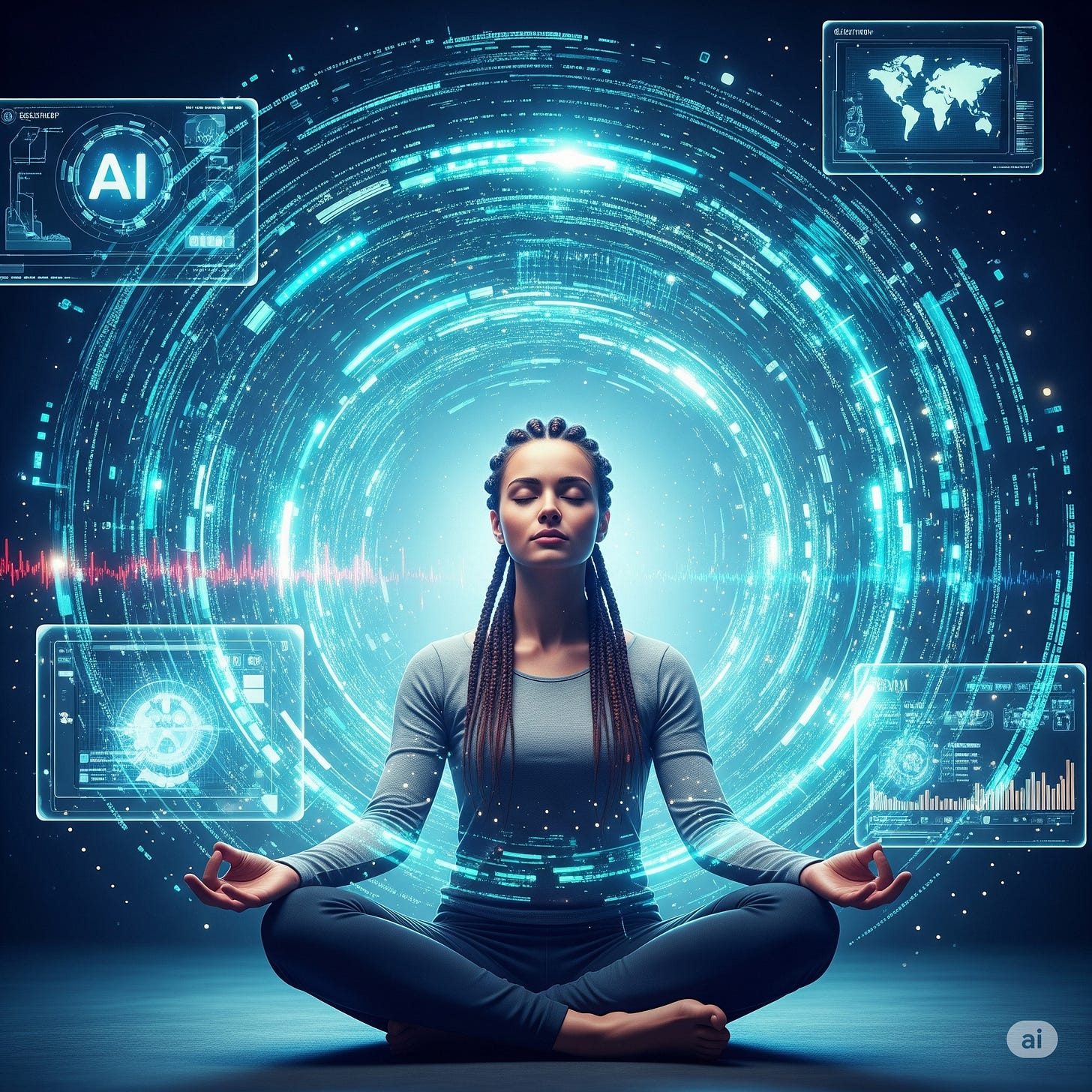Future-Proofing Your Self: A Survival Guide for the Age of AI | Part IV
The illusion of self and why it matters now
Welcome back to our series on the illusion of the self.
If you're just joining us — welcome! Excited to have you on this mind erasing bending journey.
That said, if you want this essay to truly land, highly suggest starting at the beginning with Part I. Links to each essay below:
We've traveled far.
From the origins of this illusion, to wide-eyed babies, to how/why you 'have no head', to empirical evidence exposing the glitch in the Matrix.
The key takeaways?
You are not the thinker of your thoughts. You are not the pilot behind your eyes. You are not a permanent self riding around in a biological vehicle.
You're an ever adapting story, told in real time by a nervous system trying to keep you alive.
This might land intellectually. But if you're like me... it doesn't matter. Experientially, the illusion remains. And the more I poke at it, the feeling of self doesn't just remain... It rebels.
As if under attack, a self-defense mechanism is awakened. The whispers turn into screams,
"I'm real damnit! And I'm in control... All those desires? Success, money, power, sex.. we will and shall have it all. Onward!"
*sigh...
So what the hell is one to do? It all seems so... futile.
My first thought is to give up and just keep living my life and being... my self.
But then I see the progress of AI. I see how it's merging with augmented/virtual reality. I see how our sense of self — bombarded by virtual influence and mimetic desire — is soon to be swallowed whole, chewed up, and spit out.
I then turn back to my newborn daughter, Chloe. Her eyes are still too young to focus. But sometimes, her eyes lock onto mine. Or at least, they appear to... and in that moment of connection, I forget myself.
Not in the poetic sense. I mean literally: the “me” doing the watching fades. No inner narrator. No ego analyzing the moment for meaning or metrics. Just sensation. Soft skin. Warm breath. An open field of aliveness.
It lasts a few seconds, at most. Then my mind snaps back into its default groove— remembering all the things it wants to be. The roles. The performance. The problems to solve.
But that glimpse is enough. Enough to know that something deeper is possible. And not just possible—but necessary, especially in the face of exponential tech + change.
So what is that thing? And how do we hold onto it in spite of our inner tyrant?
We need a new perspective. A new mental model for reality; for what experience really is (and isn't).
And to achieve this, we need new tools. Or as I like to say, we need to use tech to combat tech. A form of jiu jitsu, if you will... using tech's momentum against itself.
Towards that end, we won't negate the self head-on. We'll first zoom out and move up stream of subjective experience.
We have to look at our environment and our relationship with it. Only then can we answer the ultimate question: if we're not a 'self', what are we? Because a mere 'story' feels... unsatisfying.
The answer is multi-layered. This essay will peel back each and expose the kernel of what makes the human experience so unique.
What I've found, is that the deeply human is paradoxical. It suggests we are beyond being just merely human...
Persons vs. Selves
So what are we?
The most direct answer I’ve found comes from modern day philosopher Jay Garfield.
In his his book, Loosing Ourselves, Garfield argues that we’re not fixed “selves” floating above the world—we’re “persons,” embedded in it.
What’s the difference?
A self is imagined as independent, essential, and constant. It's somehow... pre-existing, or prior to.
A person is none of those things. A person is a process—a pattern—a psycho-physical dance that only exists because of its entanglements with everything else; our biology, our social interactions, and our ongoing experiences.
The common metaphor in Buddhism is a wave on the ocean. A 'self' is the mistaken belief that you are a separate, independent drop of water, riding the wave.
A 'person' is the wave itself—a temporary form that is inseparable from the ocean it emerges from, shaped by the winds of culture and the tides of relationships.
As a pianist, I prefer the analogy of music: a person is more like a song—it only exists while it's being played. It is the interplay of notes and the instrument, not some hidden essence behind them.
In other words, we don't pre-exist and then decide to interact with the world; we emerge from it. We are a messy, dynamic, and beautiful tangle of our genetics, the language we speak, the culture we inhabit, and the people we love.
This isn't just a semantic game. It's a fundamental shift in our operating system. And this new OS matters, because the isolated 'self' is a fragile target for this next wave of tech/AI; easily hijacked by algorithms.
But a person?
A person is (as Bruce Lee would say) like water. It's fluid, adaptive, and finds stability not in separation, but in connection, with nature and with other people... Real people.
Spotlight vs Floodlight Consciousness
To further ground this idea, I turn to Alan Watts—a thinker who, in my view, revealed some of the deepest truths about modern affliction.
If Garfield gives us the academic language of “persons,” Watts gives us the poetic, spiritual framework for where we fit in. He tackles the same illusion but zooms out—from the mind to the cosmos.
In this lecture The Myth of Myself, Watts argues that our core delusion is the idea of the “skin-encapsulated ego”—that little ‘me’ we imagine trapped inside our heads, peering out at a foreign world. This hallucination splits “self” from “everything else,” casting life as a battle between a lonely subject and a cold, indifferent universe.
We feel like strangers here—confronting reality, facing facts, trying to conquer nature. Poet A.E. Housman said it best: “I, a stranger and afraid, in a world I never made.”
Watts traced this alienation to what he calls "two myths of the West".
First, is the myth of the universe as an artifact, i.e. a pot crafted by a cosmic potter, aka 'god'.
This is the religious view. And it makes us feel perpetually judged, like we’re on divine probation, perpetually proving ourselves worthy of existence (in this world or the next).
Then came the scientific view. This produced the myth of the universe as a cosmic fluke, i.e. an aimless probability machine, powered by blind energy. This view makes us feel like a meaningless accident.
One makes us sinners, the other specks. Both leave us feeling unfulfilled and like we don’t belong.
To rectify, Watts offers a third story. He argues that the universe isn’t a top-down creation, nor is it a bottom-up accident. Rather, it’s an intelligent, self-expressing organism.
And its form expression?
You, me, us.
We aren’t a fluke of the universe; we are a feature of it. Watts famously says, just as an apple tree “apples,” the cosmos “peoples.” We didn’t arrive in this world—we emerged from it. Like a leaf from a tree, we are functions of the universe, not anomalies within it.
So where Garfield’s “person” emerges from a social and biological context; Watts’ “you” emerges from the entire cosmos. It’s the same idea, just at a different resolution.
We are what the whole cosmos is doing at the place we call here and now. Each one of us is a unique "waving" of the entire universe.
But if this is true, why do we feel like a lonely pilot in the skull? Why the profound sense of separation? Of subject and object?
Watt's creates a bridge between cosmic truth and psychological illusion. He explains that our feeling of being a separate ego is a direct result of specializing in one particular form of consciousness, while ignoring another.
Those two forms are "the spotlight and the floodlight".
The spotlight is conscious attention. It’s the narrow, focused beam we’re trained from childhood to value above all else. When a teacher says, “Pay attention!” we fix our minds on one thing at a time. Our culture teaches us this capacity matters most. And so we believe, “I am my spotlight consciousness. That is my ego. That is me.”
But floodlight consciousness is always on. It is the vast, peripheral, holistic awareness that drives the car for miles while your spotlight is busy chatting with a friend. The floodlight is what beats your heart, grows your hair, and registers the entire field of sound and space around you without you “thinking” about it. Every nerve ending is its instrument.
The illusion of being a self is simply the habit of mistaking 'spotlight consciousness' for the whole show.
We’ve forgotten that we are also the floodlight. The floodlight is the waving cosmos, the entire field of being. The spotlight is just where the floodlight—the universe itself—has decided to focus its attention through you, for a mere moment.
Becoming aware of this is the mystical experience you hear about through meditation, psychedelics, and even states of flow. In these moments, you realize your real, deep self is not the fleeting beam of attention, but the entire field of awareness it moves through.
As Watt's states in his talk, you are not the headlight, unaware of the battery it’s wired to. You are the whole circuit.
Realizing this dissolves the ultimate fear... The fear of death. An isolated spotlight can be switched off. But the floodlight, the great field of being, simply transforms.
The wave returns to the ocean it was never separate from.
As Watts would say, you are the eternal thing that goes and comes. One day, you wake up, look out at the stars and realize, “Why, that’s me.”
Neuro-Tech Buddhism
This might all sound a bit too hippy dippy woo woo for you.
It might also sound too abstract, if not entirely out of reach.
I felt the same way. These ideas tickled something deep in my being, but they remained slippery. And I struggled to see how to make them land for average Jane/Joe.
And then I came across a quote from one of my favorite authors, Ursula Le Guinn.
It echoes the same problem called out by Watts: the divide between humans and nature, and the resulting alienation.
Le Guin says:
"One way to stop seeing trees, or rivers, or hills, only as ‘natural resources,’ is to class them as fellow beings—kinfolk. Subjectify them, instead of objectifying them. I guess I am trying to subjectify the universe, because look at where objectifying it has got us. To subjectify is not necessarily to co-opt, colonize, exploit. It may involve a great reach outward of the mind and imagination."
A great reach outward... of the mind and imagination.
Well, if there's one tool capable 'subjectifying, and extending the mind... it's our favorite topic de jour: spatial computing, aka virtual reality, augmented reality, mixed reality, etc.
This brings us full circle, back to modern day philosopher, Thomas Metzinger.
If Le Guin calls for a new kind of perception—one rooted in kinship, not conquest. Metzinger suggests a way to build it, with spatial computing + AI.
I've explored similar use cases in my previous essays.
The first was the Ultimate Promise of the Metaverse back in 2021:
I think the key to mental resilience and joy are regular reminders of everything that exceeds us. Things that disintegrate the ego and remind us of the smallness of our everyday lives. Things that remind us we are mere dust in the cosmos, made of the stars themselves. That we are, as Carl Sagan said, “a way for the cosmos to know itself”. We need daily doses of something similar to the famous ‘overview effect’ that astronauts express when viewing the earth from space. What if the Metaverse could be littered with ‘overview effects’? On-demand experiences that would allow us to feel a connection to the grandness of the universe and the miracle of our own consciousness?”
I continued this thread in ‘The Ultimate Promise of Spatial Computing’, exploring the science of awe and its capacity to rewire us from the inside out:
“The ultimate conclusion? Awe shifts our focus from the self to the vastness of the external world, creating a sense of connection and well-being, while promoting greater generosity and cooperation. Towards this end, the researchers explore simple daily activities, such as taking an "awe walk" and intentionally noticing beauty in the world. Nature-based 'awe walks' will and should always be our first option. But 'awe on demand' via 'spatial/salient computing' could become the next best thing, with arguably more magic and tastefully curated forms of novelty, curiosity, and surprise. While virtually induced, I don't view these transcendent mind-states as disconnected from reality. They just might be the most real experiences we can have…”
Metzinger holds similar beliefs, viewing immersive tech as a way to hack our inner tech and reveal truths about the self; a kind of flight simulator for consciousness.
If you recall from Part I, Metzinger’s big idea is the "Phenomenal Self-Model"—the internal avatar your brain stitches together from a constant flood of signals: sights, sounds, memories, and bodily sensations.
Because that avatar is a construction, AR/VR can hijack and remix those signals, revealing the seams. A well-designed simulation, he argues, could grant ordinary people the kind of ego-softening insight that monks and mystics have pursued for millennia, but with a crucial twist: under controlled, reversible, lab-grade conditions.
He imagines a variety of tools for playing with the source code of identity:
A Dial for the Self: A virtual slider that lets you increase your sense of agency, until the entire scene feels like "you," then fade it out until you are nothing but a pure witness to the world.
Embodiment Hacks: The ability to body-swap into an avatar with elongated limbs, an animal’s form, or a different gender, showing just how effortlessly the feeling of "me" migrates to a new home.
AI Hijacking: You control a virtual body, but occasionally, an AI agent takes over your limbs. An action happens, but you didn't do it. The clean line between your intention and the world's action begins to blur.
Reality Faders: A simulation where the world’s textures slowly morph from photorealistic to overtly synthetic, allowing you to feel the precise moment your brain’s faith in an “outer” reality begins to crack.
The goal here isn't just a joyride. In pairing these experiences with brain-imaging technology, we can turn VR suites into engineering labs for the mind.
We could finally map how agency, body-ownership, and perspective click together—and potentially learn how to therapeutically loosen their grip in conditions like PTSD, depression, or chronic pain.
But like all frontier tech, this can cut both ways.
These tools would be like a digital psychedelic: potent, reality-bending, and profoundly double-edged. Without strict, open-sourced ethical guidelines, it could easily become a black-box for persuasion and addiction.
We would need to figure out the right measures of success/impact. Some way of separating a 'trippy novelty' from what ancient Greek's called 'eudaimonia', aka our capacity for well-being, flourishing, and realizing one's full potential.
If so, and if designed with wisdom, tomorrow’s headset may one day sit beside the meditation cushion as a core tool for waking up, proving that the wildest frontier isn’t outer space, but the inner cosmos of the mind itself.
Epilogue
Many people will resist these use cases and this future.
But the truth is… it’s inevitable. The train's far down the tracks. These simulations will exist, whether we like it or not.
The key will be to never forget: they’re still simulations; a means, not an end. A compass, not a destination. Perhaps technology can help here as well.
Regardless, the most powerful reminders of our true nature won’t come from code. They’ll come from something softer. Warmer. Human.
For me, that's now a baby, blinking up from her crib.
As I write these final words, Chloe sleeps peacefully, blissfully unaware that she's already living the truth I've spent thousands of words trying to uncover.
She doesn't yet know she's supposed to feel separate. She hasn't learned to hallucinate a solid self. She simply is.
Which makes me wonder...
Maybe the real revolution isn't in the technologies we'll build, but in remembering what we were before we forgot what we are.
Maybe the future of consciousness isn't about transcending our humanity, but about relaxing into it more completely.
Because as we've learned, the deeply human is yet another paradox. It shows that we are beyond being merely human.
As such, the illusion of self isn't a problem to be solved, but a game to be played more consciously—with more humor, more lightness, more love, and certainly... way less anxiety.
After all, if the self is just a feeling, and there's no one here to take credit for this essay, then there's also no one here to be worried about getting it wrong.
And that, perhaps, is the most liberating feeling of all.
THE END
If you made it this far… THANK YOU for making the time + effort.
I hope you enjoyed the journey and feel more prepared for this looming era of extreme change. If so, please consider sharing this essay with a friend or two. The more self-less 'persons’ out there the better ;)






